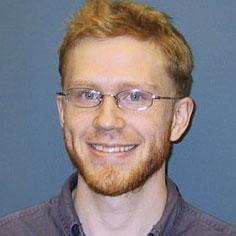
Duff Neill
Physics graduate student, theoretician, LHC Theory Initiative Award recipient
Bio
Fine-tuning theoretical predictions
Duff Neill spends his days looking for a needle in a haystack. Or, more specifically, he's calculating how to recognize the needle. Neill, a third year Physics graduate student, makes theoretical calculations to help physicists interpret the data that will emerge from the high-energy proton collisions at the Large Hadron Collider (LHC), the world's most powerful particle accelerator. At the LHC beams of protons will zip around the 17-mile track at nearly the speed of light, crashing into each other with unprecedented energies.
"The environment in which collisions take place is exceedingly complex," says Neill. "Protons create a mess when they collide, with particles flying off in every direction. You have to filter the noise so that you can see the more subtle effects."
At the LHC, some 600 million proton-proton collisions will take place every second, generating roughly 15 million gigabytes of data a year. Scientists from around the world will analyze the data, sifting through the myriad particles produced by the collisions in search of answers to some of physics' greatest mysteries, like the elusive Higgs boson, extra dimensions and dark matter particles, just to name a few.
Neill is fine-tuning theoretical predictions about what will happen during the proton-proton collisions in the LHC. These predictions should help scientists in their quest for the Higgs boson, which physicists believe may be linked with the way particles acquire mass. Theoretical predictions like those Neill is working on can estimate how many Higgs particles will be produced in any given collision. Things get tricky, however, because each collision produces many particles - not just Higgs bosons - that must be accounted for in order to reconstruct the whole process. Neill uses Effective Field Theory to accurately forecast all the parameters of a collision, giving experimenters the information they need to either find something specific or identify an unexpected result.
Neill and his advisor Professor Ira Rothstein represent a small contingent of theoretical physicists in the United States doing LHC-related research with Effective Field Theory. Neill hopes that the LHC Theory Initiative Graduate Travel Award will allow him to visit CERN, the LHC's home at the Franco-Swiss border near Geneva, and to travel to various conferences to expand his knowledge on Effective Field Theory and other techniques, which will get him even closer to finding that elusive needle in the haystack.